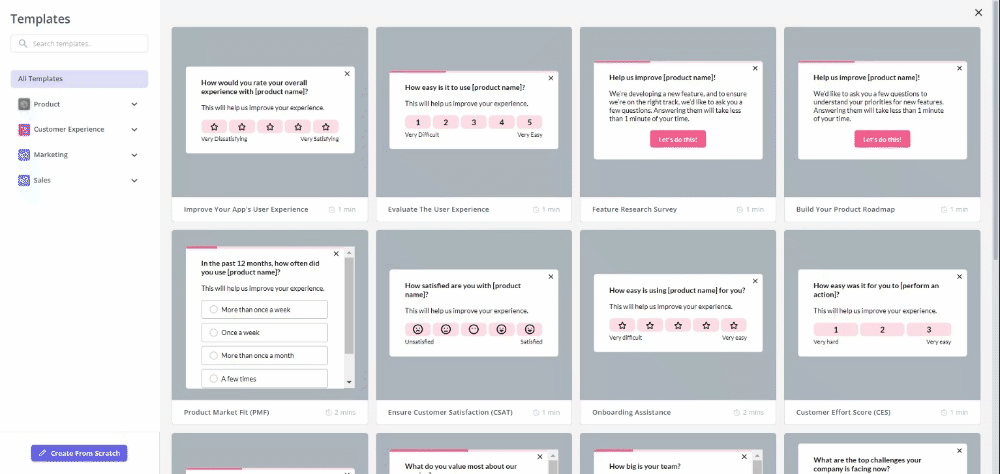
Try Userpilot Now
See Why 1,000+ Teams Choose Userpilot

Best resources for UX researchers
To excel as a UX researcher, it’s crucial to stay informed and continuously learn from a variety of resources.
Here are some top recommendations for books, webinars, podcasts, and blogs that every UX researcher should explore.
Best books for UX researchers
Reading books by industry experts can provide deep insights and practical knowledge about UX research and design.
- “The User Experience Team of One” by Leah Buley – Offers practical advice for UX practitioners who are working solo or within small teams.
- “Observing the User Experience” by Elizabeth Goodman, Mike Kuniavsky, and Andrea Moed – A comprehensive guide on conducting user research with practical methodologies.
- “Lean UX” by Jeff Gothelf and Josh Seiden – Focuses on integrating UX with Agile methodologies to improve collaboration and efficiency.
- “Measuring the User Experience” by William Albert and Thomas Tullis – Provides insights into quantitative research methods and metrics for UX.
- “Don’t Make Me Think” by Steve Krug – A classic book on web usability that remains relevant for UX research and design.
Best webinars for UX researchers
Participating in webinars can offer real-time learning and insights from industry experts.
- Userpilot Webinars – Focused on user onboarding, engagement, and product growth.
- NNG (Nielsen Norman Group) Webinars – Provides expert insights on various UX topics, including usability and user research.
- Interaction Design Foundation Webinars – Covers a wide range of UX research and design principles.
- Baymard Institute Webinars – Offers in-depth discussions on UX research for e-commerce usability.
- UX Design Institute Webinars – Provides detailed webinars on UX design principles and career advice.
Best blogs for UX researchers
Following blogs can help you stay updated on the latest trends, tips, and best practices in UX research and design.
- Userpilot Blog – Insights on user onboarding, product growth, and UX design.
- NNG (Nielsen Norman Group) Blog – Research-based articles on UX design and usability.
- Smashing Magazine – Covers a wide range of topics, including UX design, web development, and product management.
- UX Matters – Offers practical advice and insights on various UX research and design topics.
- UX Collective – Community-driven platform with articles on UX research, design, and industry trends.
These resources provide valuable knowledge and practical advice, helping you stay current and excel in your role as a UX Researcher.
Best podcasts for UX researchers
Listening to podcasts is a convenient way to stay informed and inspired by industry leaders while on the go.
- “User Defenders” – Interviews with UX design heroes who share their stories and insights.
- “The UX Intern” – Conversations with UX professionals about their career paths and experiences.
- “UI Breakfast” – Discusses UI/UX design, product strategy, and business with various experts.
- “What is Wrong with UX” – Two experienced UX designers critique current trends and practices.
- “Awkward Silences” – Focuses on user research and customer experience insights.
Best certifications for UX researchers
While hands-on experience and a compelling portfolio are crucial for UX researchers, certain certifications can validate your expertise and help you stand out in the competitive job market. So here are some course suggestions for you:
- Nielsen Norman Group UX Certification: This remains the gold standard in the UX field, and their UX Research certification is highly respected and sought after by employers. It offers a comprehensive curriculum covering a wide range of research methodologies and best practices.
- User Experience Research and Design Specialization (University of Michigan – Coursera): This comprehensive program remains a top choice for aspiring UX researchers. It covers the entire UX research process, from planning and conducting studies to analyzing data and communicating findings. The specialization culminates in a capstone project where you’ll apply your skills to a real-world research problem.
- UX Research at Scale: Surveys, Analytics, Online Testing (University of Michigan – Coursera): This course is an excellent complement to the specialization mentioned above. It focuses on quantitative research methods, teaching you how to design and analyze surveys, collect and interpret web analytics data, and conduct online experiments.
- DesignLab’s UX Academy: This immersive bootcamp provides hands-on training in all aspects of UX design, including a significant emphasis on user research. You’ll work on real-world projects, receive mentorship from industry experts, and build a strong portfolio to showcase your skills.
Best tools for UX researchers
Leveraging the right tools can significantly enhance the efficiency and effectiveness of UX research.
Here are some of the best tools for various aspects of UX research, each tailored for specific use cases:
- Best tool for User Onboarding and Engagement – Userpilot: Userpilot helps UX researchers design and test personalized in-app experiences and onboarding processes. It allows researchers to gather real-time user feedback and insights to improve user engagement and retention.
- Best tool for Project Management – Monday: Monday.com is excellent for organizing and managing research projects. It provides a visual platform that helps UX researchers track tasks, timelines, and collaboration with team members, ensuring that projects stay on schedule.
- Best tool for Product Management – Jira Software: Jira Software is ideal for tracking and managing research tasks, user stories, and sprints. It integrates well with other tools and allows UX researchers to collaborate closely with product teams, ensuring that research findings are effectively incorporated into product development.
- Best tool for Customer Experience – Zendesk: Zendesk helps UX researchers gather and analyze customer feedback and support tickets. This tool provides insights into common user issues and areas for improvement, which can inform user experience design.
- Best tool for Customer Success – ClientSuccess: ClientSuccess is perfect for monitoring and analyzing customer success metrics. UX researchers can use this tool to understand how well users are achieving their goals with the product, providing data to drive improvements in the user experience.
- Best tool for UX/UI Design – Figma: Figma supports real-time collaboration on design projects. UX researchers can use Figma to create wireframes and prototypes, test usability, and gather feedback from users and stakeholders.
- Best tool for UX/UI Design – Sketch: Sketch is a vector graphics editor focused on digital design. It offers numerous plugins and integrations that streamline the design process, making it easier for UX researchers to create and test user interface designs.
- Best tool for Documentation and Collaboration – Confluence: Confluence is great for creating, sharing, and managing research documentation. UX researchers can use it to keep detailed records of research findings, methodologies, and insights, facilitating collaboration and knowledge sharing within the team.
- Best tool for Data Analytics – Tableau: Tableau provides powerful data visualization capabilities. UX researchers can use it to analyze and present research data in an intuitive and visually appealing manner, making it easier to communicate insights to stakeholders.
These tools collectively empower UX researchers to conduct thorough research, manage projects effectively, collaborate with teams, and present data-driven insights that enhance user experience design.
Conclusion
Professional growth is a continuous journey, and investing in your development is key to staying competitive in the field.
We hope this guide has equipped you with the tools and knowledge needed to excel in your role.
Looking into tools for UX researchers? Userpilot is an all-in-one product platform with engagement features and powerful analytics capabilities. Book a demo to see it in action!








